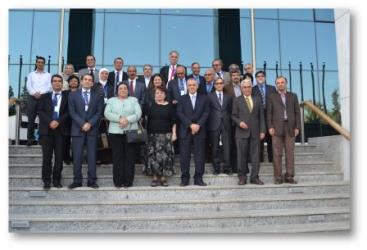 WHO convened a meeting of the Eastern Mediterranean Advisory Committee on Health Research in Cairo, Egypt on 6–7 July 2015.
WHO convened a meeting of the Eastern Mediterranean Advisory Committee on Health Research in Cairo, Egypt on 6–7 July 2015.
The objectives of the meeting were to bring together Advisory Committee members and international research experts to: acquaint Advisory Committee members with revised terms of reference; streamline research activities in the Region with the five regional strategic health priorities of work; and discuss best methods to support capacity-building for health research in the Region, with special emphasis on priority-setting, research methods (especially health systems and implementation research) and research ethics.
In his opening address, Dr Ala Alwan, WHO Regional Director for the Eastern Mediterranean, emphasized the role of WHO in supporting and promoting health research as per the WHO Constitution, and highlighted the importance of partnership with different stakeholders in building consensus on a research agenda in line with the five strategic priorities for WHO’s work in the Region.
The terms of reference of the Eastern Mediterranean Advisory Committee on Health Research are to advise the Regional Director on issues related to health research and development in the Region including: recommending and evaluating regional health research policies and priorities in line with the 5 strategic priorities; promoting research as a key tool for health development and formulating evidence-based policies and actions for change; supporting the development of effective health research systems and strengthening research capacities; providing advice on ethical criteria applicable to health research activities; and reviewing research activities, monitoring their execution, evaluating their results from the standpoint of scientific and technical policy development and application.
During the meeting, participants suggested strategic actions for WHO to support health research in the Region, including:
building institutional capacity and linkages between well established and newly developed institutions (academia and programmes)
providing support through implementation and follow-up of outcomes (training, research grants)
supporting institutional research careers (universities, research institutions)
identifying centres of excellence/collaborating centres which could provide and sustain capacity-building
changing the culture and mind-set to promote research and ethics for all health professionals
encouraging intersectoral collaborative and joint research (national, regional, international)
developing large databases for research (building on available databases in each country)
promoting research in health ministries, and enhancing the priority given to use of results in health-policy making
focusing both on researchers and on those who draw on research to guide policy and decision-making
building skills necessary for: commissioning research; understanding and using research results; using the research results to brief health policy-makers; and publicizing the results of the research.
Details of the meeting’s deliberations and outcomes are included in a sumary meeting report.


